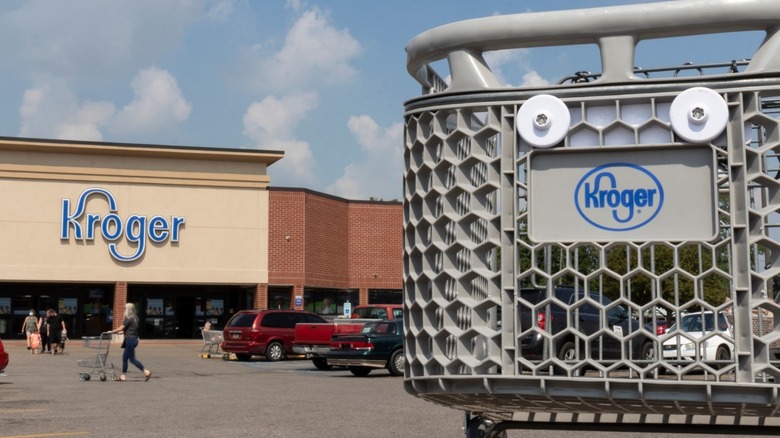Kroger Employee Arrested For Allegedly Committing Disturbing Crime In Restroom
Kroger is the nation's second most popular grocery store by market share, according to Statista. Although Walmart emerged as the "far and away leader" in 2017, boasting over 25% of the nation's grocery market share, Kroger offers what some consider to be an irresistibly old-school vibe – which is likely a natural extension of the fact that Kroger has been around in some form or another in the "selling groceries" business since before the turn of the 20th century. Right now, however, Kroger is dealing with a very modern legal issue.
Specifically, on the afternoon of March 1, 2022, the Oxford County police department fielded a call from a woman, saying "she was in the women's bathroom [at Kroger] and saw a cell phone come from the stall next to her and believed somebody was trying to record her while she was in the stall," a Lieutenant Hildon Sessums from that department told WREG. Identified as Jaxson Parker, a Kroger employee, the suspect was arrested and subsequently charged with an invasion-of-privacy crime under Mississippi law. Here's everything we know about this disturbing incident, which may be both a crime and the basis for a costly civil lawsuit.
A privacy crime for the digital age
The Mississippi criminal code prohibits people from making recordings of others, without prior consent, in any "place where a person would intend to be in a state of undress and have a reasonable expectation of privacy" (per The Reporters Committee for Freedom of the Press and WomensLaw). Such places would almost invariably include a public restroom such as the one at Kroger's.
To be held liable under this particular state law (Miss. Code Ann. § 97-29-63), the violation of which is deemed a "felony," it must be proven that the recording was made with "lewd, licentious, or indecent intent." Presumably, police had "probable cause" to arrest the suspect, 19-year-old Parker, because the circumstances, such as they were, would appear to strongly suggest such intent on the part of Parker. If Parker is brought to trial in Mississippi, he faces the potential of significant prison time, possible fines, and a permanent blot on his record (applying for a job almost invariably brings up the question of whether one has ever been convicted of a felony).
In addition, according to Laws101, one who has been judged guilty of this invasion-of-privacy crime may also end up being "ordered to pay damages" directly to the victim because obtaining a criminal judgment requires more proof than in a civil case. Thus, a conviction is considered evidence that the perpetrator should be held liable for money damages.

